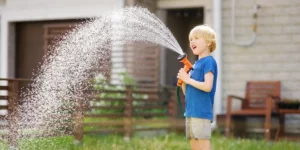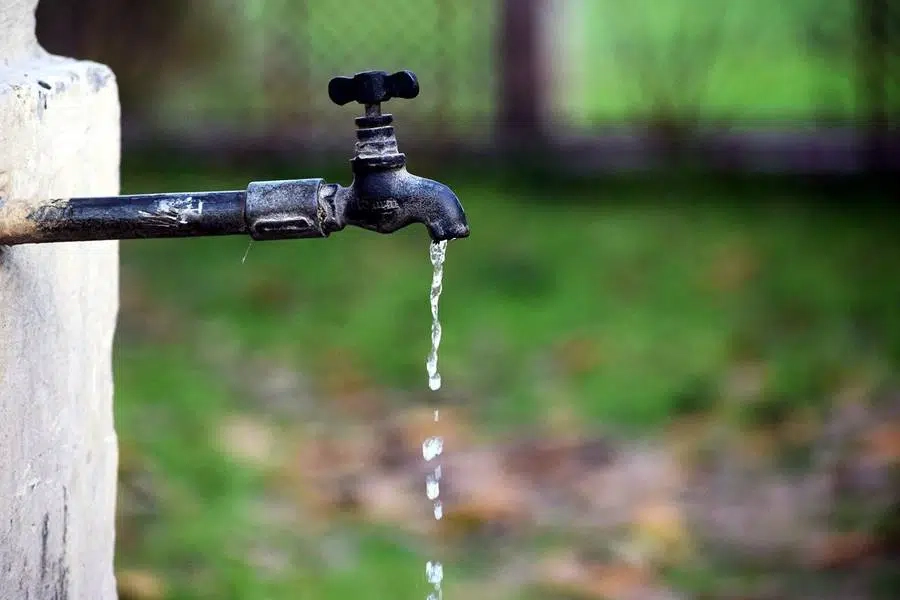Water conservation at home greatly impacts community health and sustainable sports. By minimizing water waste, households can help maintain local sports facilities, ensuring safe and ideal conditions for athletes. This practice not only supports physical performance but also enhances public health through improved drinking water availability and sanitation. Understanding the interconnectedness of these factors highlights the urgency of conservation. What practical steps can communities take to promote how to reduce water waste at home?
Key Takeaways
- Reducing water waste at home ensures more water availability for local sports facilities, enhancing their maintenance and quality.
- Efficient water use at home lowers operational costs for sports facilities, allowing for better funding and resources for community activities.
- Conserving water at home supports sanitation efforts, reducing waterborne diseases and promoting overall community health.
- A culture of water conservation at home fosters community bonds, encouraging collaborative efforts in maintaining local sports and recreational spaces.
- Sustainable water practices now will ensure future generations have access to clean water, benefiting both community health and sports development.
The Importance of Water Conservation for Community Health
Although water is often taken for granted, its conservation plays an essential role in promoting community health and sustainability. Effective water management not only guarantees access to clean drinking water but also supports sanitation and hygiene, critical elements for public health. Communities that prioritize water conservation can reduce the incidence of waterborne diseases, fostering a healthier population. Additionally, conserving water helps maintain local ecosystems, which in turn supports biodiversity and recreational spaces that enhance community well-being. When individuals engage in reducing water waste at home, they contribute to a collective effort that strengthens community bonds. This shared responsibility fosters a sense of belonging, as residents unite to protect their environment and promote a healthier, more sustainable future for all.
Understanding How Water Waste Affects Local Sports Facilities
While many may not realize it, the impact of water waste extends beyond individual households, considerably affecting local sports facilities. These venues often rely heavily on water for maintenance, irrigation, and sanitation. Excessive water waste can lead to increased operational costs, ultimately straining budgets that could otherwise support community programs or facility upgrades. Additionally, reduced water availability may compromise the quality of playing surfaces, impacting athletes’ performance and safety. Communities that prioritize water conservation not only enhance their local sports facilities but also foster a sense of belonging and shared responsibility among residents. By understanding how water waste affects these essential spaces, individuals can take meaningful steps to reduce water waste at home, contributing to the overall sustainability and health of their community.
Practical Tips on How to Reduce Water Waste at Home
A considerable number of households can make a substantial impact on water conservation by implementing practical strategies to reduce water waste at home. Simple measures, such as fixing leaks promptly and installing low-flow fixtures, can markedly lower water usage. Homeowners should also consider collecting rainwater for gardening, which not only conserves water but also supports local greenery. Additionally, mindful practices like taking shorter showers and running dishwashers only when full can lead to considerable reductions in water consumption. By educating family members about these practices, households can foster a culture of sustainability and community responsibility. Ultimately, adopting these strategies not only benefits individual homes but also contributes to broader environmental health and resource conservation initiatives.
The Role of Community Engagement in Promoting Water Sustainability
Community engagement plays a pivotal role in fostering water sustainability initiatives. By involving residents in discussions and activities centered around water conservation, communities create a sense of belonging and shared responsibility. Collaborative efforts, such as local workshops and clean-up events, not only educate participants on how to reduce water waste at home but also strengthen social ties. Engaging diverse groups encourages the exchange of ideas and practices, making sustainable behaviors more accessible. Additionally, when community members see their neighbors actively participating in water conservation, they are more likely to adopt similar habits. Ultimately, fostering a culture of collaboration and awareness leads to a collective commitment to sustainable water use, benefiting both community health and the environment.
Long-term Benefits of Water Conservation for Future Generations
As society grapples with the challenges of climate change and dwindling natural resources, understanding the long-term benefits of water conservation becomes increasingly essential. Implementing strategies on how to reduce water waste at home not only preserves crucial resources but also fosters a sustainable future for generations to come. The enduring advantages of water conservation can be summarized as follows:
- Resource Availability: Guarantees that future generations have access to clean and sufficient water.
- Cost Savings: Reduces household expenses through lower water bills, allowing funds for other community needs.
- Environmental Protection: Minimizes ecosystem degradation, promoting biodiversity and healthier habitats.
- Community Resilience: Strengthens local infrastructure and preparedness for water scarcity challenges.
Frequently Asked Questions
What Are Some Common Sources of Water Waste in Households?
Common sources of water waste in households include leaky faucets, inefficient toilets, prolonged showers, and overwatering gardens. Addressing these issues can considerably reduce water consumption, fostering a more sustainable lifestyle and enhancing community well-being.
How Do Local Sports Teams Contribute to Water Conservation Efforts?
Local sports teams often engage in initiatives promoting water conservation, such as educational campaigns and environmentally friendly practices. These efforts foster community involvement, encouraging members to adopt sustainable behaviors and collectively reduce water waste in their households.
What Are the Financial Benefits of Reducing Water Waste at Home?
Reducing water waste at home considerably lowers utility bills, fostering financial savings. These savings can enhance household budgets, allowing families to invest in community initiatives, ultimately promoting a sense of belonging and shared responsibility in environmental sustainability.
How Can Schools Promote Water Conservation Among Students?
Schools can promote water conservation among students by implementing educational programs, encouraging participation in water-saving initiatives, integrating conservation into the curriculum, and fostering a culture of stewardship, thereby fostering a sense of community responsibility and belonging.
Are There Government Incentives for Reducing Water Waste at Home?
Governments often provide incentives, such as tax rebates and grants, to encourage homeowners to reduce water waste. These initiatives promote sustainable practices, foster community engagement, and ultimately contribute to a healthier environment for all.
Conclusion
To sum up, reducing water waste at home is a pivotal step toward enhancing sustainable sports and fostering community health. By conserving water, households not only support the maintenance of local sports facilities but also contribute to the overall well-being of their communities through improved sanitation and access to clean drinking water. Collective efforts in water sustainability promote a culture of responsibility, ensuring that future generations can enjoy both vibrant sports environments and healthy living conditions.
You May Also Like To Read:
